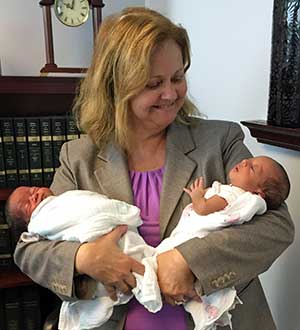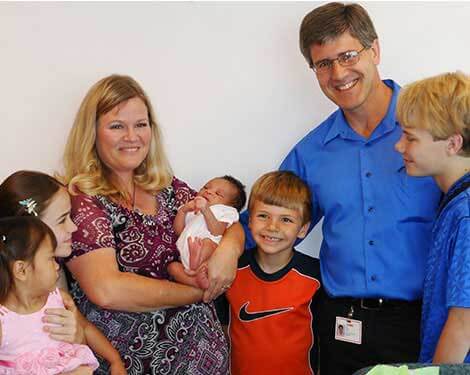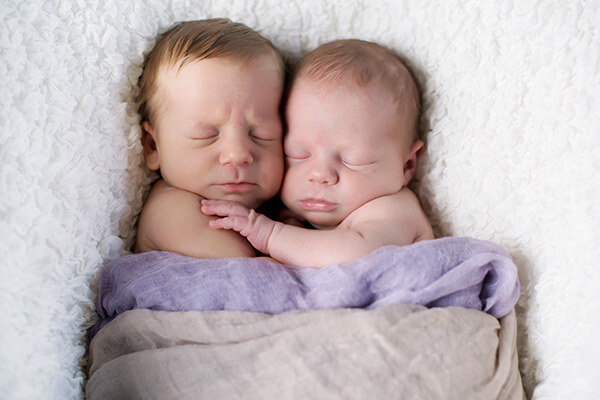If you’re considering a North Carolina adoption, you’ve come to the right place. At Parker Herring Law Group, PLLC, we can help you complete whatever kind of adoption you need, whether you’re a pregnant woman considering adoption or a prospective adoptive parent(s).
As a board-certified specialist in family law, North Carolina adoption attorney E. Parker Herring is well experienced in assisting families and pregnant women who are in the same situation as you. She understands the emotional and physical difficulties of your situation, which is why she strives to provide compassionate service that makes your needs her priority.
Her career has revolved around adoption law and, Parker Herring Law Group, PLLC co-founded the adoption agency A Child’s Hope. E. Parker Herring is an adoptive mother herself. Parker Herring Law Group, PLLC formed the nonprofit Friends of Adoption and lobbied successfully to make major changes in the state’s adoption laws. Herring stays active in the state’s legislative process by membership in the state-wide Adoption Committee.
In guiding you through adopting in North Carolina, we can provide all the legal assistance you need and refer you to any other adoption resources you may need — whether that’s an adoption agency to get you started or counseling services to assist you through the adoption process.
Below, you’ll find information on all of the different kinds of North Carolina adoptions we complete. You can also call us anytime at 919-821-1860 or contact us online to discuss your individual situation and the options available to you. Conveniently located in North Carolina’s capital, we can assist with any Raleigh adoption or any other adoption across the state.
Agency Adoption in NC
Agency adoptions are, of course, adoptions completed through an adoption agency licensed in North Carolina. The North Carolina Department of Health and Human Services (NCDHHS) provides a state-wide listing of adoption agencies by county. Each of these agencies is licensed by the state of North Carolina and must go through a regular relicensing process.
Parker Herring is one of the founders of the North Carolina based adoption agency, A Child’s Hope, and she still directs the agency. The agency focuses on matching North Carolina couples with North Carolina newborns and has placed over 330 children since 2000.
Open and Closed Adoption

Today, the typical adoption in the United States involves some degree of openness. However, open adoption in North Carolina means different things to different people. It is important to be clear about what you intend.
At its most basic level, having an open adoption means that adoptive parents are going to know the name of the biological mother and she is going to know the adoptive parent’s names. Beyond that, deciding how much information is shared is a mutual decision.
Read more detailed information on the following adoption subjects:
- Closed adoptions
- Open adoptions
- So-called “mixed” adoptions (combining elements of closed & open or “semi-open”)
- Variance in state laws
Interstate Adoption

When a parent places a child for adoption with someone (other than a very close relative) who lives in another state, it is called an interstate adoption. Adoptions across state lines must follow the rules in the Interstate Compact on the Placement of Children (ICPC).
Special rules apply to interstate adoptions, according to ICPC regulations. Each state has its own adoption laws, and to comply with ICPC, adopting out of state requires you to meet both the laws of the state where the child is born and the state where you live.
It is crucial that adoptive parents follow the rules of both states in interstate adoptions. Adoptive parents must obtain permission from both states before the child can leave the sending state (where the child is born) and enter the receiving state where the adoptive parents live.
Gay & LGBT Adoption
With U.S. District Court Judge Max Cogburn’s ruling in Asheville on Oct. 10, 2014, the ban on gay marriage in North Carolina was declared unconstitutional and gay marriage became legal.
With the legalization of gay marriage, however, many other issues are called forward, including gay couple adoption in North Carolina.
These recent court rulings legalizing gay marriage have made same-sex adoption possible. This article addresses the most common questions about adoption for gay and lesbian couples.
Read more detailed information on the following gay & LGBT adoption topics:
- Gay marriage and gay adoption
- Documents required
- Marriage length
- Biological parents and sperm/egg donors

Independent Adoptions
Not all adoptions have to be completed with the help of an adoption agency. Whether you’re a prospective birth mother or adoptive family, if you’ve already found a match for your adoption proceedings, you may want to proceed with a private adoption, or independent adoption, instead.
But what is a private adoption?
An independent adoption in North Carolina is an adoption arranged by the prospective birth parent(s) with an identified individual or couple and is typically facilitated by an attorney. Parker Herring Law Group, PLLC, has helped numerous North Carolina families adopt this way.
Read more detailed information on the following Independent Adoption topics:
- Birth mother expenses
- Expenses associated with independent adoption
- Interstate compacts
- Fees and expenditures
- Consent
- Adoption consultations
- Independent adoption placements
Begin with an Adoption Consultation
Check out our Adoption Consultation Flyer for more information about how you can start your family.
Stepparent Adoption
Adoptions don’t only occur when a pregnant woman places her child for adoption. Thanks to a changing American family dynamic, stepparent adoptions are becoming a more common way to legally create a family — and Parker Herring Law Group, PLLC can help.
Step-parent adoption in North Carolina is a crucial part of creating a legally bound family — with all the legal and emotional benefits of a two-parent family. They’ve become increasingly popular as couples have realized the many positive benefits that can come from doing so, particularly the creation of a more cohesive family unit. In cases where the stepfather is the adopting parent, the child can take his last name and, consequently, all family members can share the same name.
Relative Adoption
If you’re interested in a kinship adoption in North Carolina, you’ve come to the right place. Nowadays, it’s more common than ever for families to be made up of more than just parents and children; grandparents, aunts and uncles and even adult siblings can act as guardians for younger children.
However, if you’re currently the guardian of a child, there are some legal protections that you don’t have that a family adoption will ensure for you. And, fortunately, the relative adoption process in North Carolina is much easier to complete than a traditional infant adoption — but you’ll still need an adoption lawyer to walk you through the process.
Adult Adoption
Not all adoptions involve a child. Many people today wonder, “Can you adopt someone over 18?” or “Can I adopt an adult?”
The answer is yes. In fact, one of the growing adoption trends is adult adoption, where a person older than 18 can be adopted by another adult or couple to formalize a parent-child relationship.
At Parker Herring Law Group, PLLC, we can help you complete the legal process of an adult adoption, which is more straightforward and easily completed than a traditional child adoption. However, because there are always legal complexities that can occur with any process involving parental rights, we encourage you to work with an experienced law firm like ours to help your adoption proceed as smoothly as possible.
International Re-Adoption
It’s no secret the international adoption process can be long and complicated. When parents arrive back in the U.S. with their adopted child, they’re often exhausted and ready to settle into life with their new child.
However, there is one more step in your international adoption process: international readoption. Although it may or may not be necessary depending on the type of foreign adoption you complete, it’s something that we at Parker Herring Law Group, PLLC highly encourage all adoptive parents do when they return to the U.S.
You’re likely to be worn out from the extensive international adoption process, but it’s imperative you do not delay the readoption of your child to ensure his or her legal status as a U.S. citizen.
Adoption of Foreign-Born Children
While we do not complete full international adoptions at Parker Herring Law Group, PLLC, we can help you with the process of adopting a foreign child living in the U.S. If you want to adopt a foreign-born child currently in the U.S., we can help you with two different processes to secure their citizenship: a family petition/E-route adoption or a special immigrant juvenile status adoption.
A child has to meet specific qualifications to be eligible for either adoption process, which is why we highly encourage you seek out experienced legal help like ours to complete these adoptions. A lawyer is key to make sure that you complete all the necessary paperwork and court hearings to properly adopt a foreign child in North Carolina.
Birth Father Rights
While infant adoption places a lot of emphasis on the pregnant woman involved, the baby’s birth father is just as important in the adoption process. Because his consent may or may not be necessary for the adoption to be completed, it’s important to consider him in any discussion you have about adoption, whether you’re a pregnant woman considering adoption, a prospective adoptive family or the birth father himself.
Whether you’re wondering how to adopt without the father’s consent in North Carolina or you’re simply interested in birth father rights in adoption, Parker Herring Law Group, PLLC can help you understand the legalities involved. As some of the most experienced adoption lawyers in the state, we’ve worked with many different cases regarding birth fathers in adoption — and we can help with whatever your adoption situation entails.
Adoption FAQs
The following are common questions about NC adoptions and North Carolina adoption law. Because the circumstances of your adoption may be unique, this summary cannot address the issues presented by every case and is not intended to provide legal advice. Please ask us if you have other questions after reviewing the following:
Do I need a lawyer to do an adoption?
Adoption changes the structure of your family. The laws governing an adoption in NC and the process for adoption are quite complex and are strictly applied. Engaging an experienced adoption lawyer is an important part of ensuring that your adoption proceeds smoothly and is not subject to challenge.
There are so many options for how to adopt. How do I choose the right one for me?
It is important to select the option that best meets your needs. An adoption attorney will answer your questions about the law and adoption process, help you assess risks involved, clarify your options, and develop a legally secure plan for adoption.
Do I need a home study?
A home study, sometimes called a pre-placement assessment, is generally required unless you are closely related to the child. A pre-placement assessment is not required in stepparent adoptions. It is also not required in certain relative adoptions. It is not required when a parent or guardian places a minor directly with a grandparent, sibling, first cousin, aunt, uncle, great-aunt, great-uncle, or great-grandparent of the minor child.
How do I identify a child available for adoption?
Most prospective adoptive parents locate children available for adoption through:
Friends and relatives
Private adoption agencies
County departments of social services
Adoption facilitators (A adoption facilitator is an individual or nonprofit entity that assists biological parents in locating and evaluating prospective adoptive parents without charge); and in North Carolina, prospective adoptive parents with a completed preplacement assessment which recommends them as adoptive parents can place advertisements seeking a child for adoption. Certain other states severely restrict or prohibit advertising.
Can I advertise?
An individual with a completed favorable home study may advertise. Advertisements may be placed in any periodical or newspaper, or by radio, television, or other public medium. The advertisement shall include a statement that (i) the person has a completed preplacement assessment finding that person suitable to be an adoptive parent, (ii) identifies the name of the agency that completed the preplacement assessment, and (iii) identifies the date the preplacement assessment was completed. An advertisement may state whether the person is willing to provide lawful expenses. Violation of this provision is a crime in North Carolina. Certain other states severely restrict or prohibit advertising.
What is an open adoption?
Adoption arrangements which include plans for continuing communication or contact between biological and adoptive parents or adopted children are called open adoptions. In North Carolina such arrangements are valid, but they are not legally enforceable. Open adoption arrangements are also available in agency placements. If both birth parents and adoptive parents agree, confidentiality restrictions can be waived. If confidentiality restrictions are waived, the agency can release identifying information to birth parents and adoptive parents allowing them to communicate directly. Without the waiver, all information must be transmitted through the agency.
Can the mother change her mind?
In North Carolina, a parent who gives consent to an adoption may revoke their consent within 7 days following the day on which it is executed, inclusive of weekends and holidays. The rules are very different in other states.
What about the father?
Every potential father has the right to receive notice that a child that he may have fathered is going to be placed for adoption. Notice means just that. He is provided notice that he has been named as a possible father and that the mother intends to place or has placed the child for adoption. Unlike a husband or legal father, an unwed biological father’s right to receive notice does not mean that his consent is required in order for the adoption to proceed. A man who fathers a child out of wedlock must take affirmative steps to show his commitment to establishing a parent-child relationship before the law recognizes his right to prevent an adoption by withholding his consent.
What if the baby is in another state?
If a child is born in State A (the Sending State) and is to be adopted by parents in State B (the Receiving State), then special rules apply. The Interstate Compact on the Placement of Children (ICPC or the Compact) applies to adoption. In those cases in which the Compact applies, the laws of both states must be satisfied before the child can leave State A and travel into State B.The Interstate Compact does not apply when the child is to be placed with a close relative of the child – the child’s parent, stepparent, grandparent, adult brother or sister, adult uncle or aunt, or the child’s guardian.
